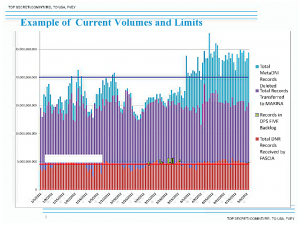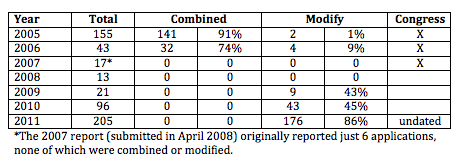Ryan Lizza has a long review of the dragnet programs. As far as the phone dragnet, it’s a great overview. It’s weaker on NSA’s content collection (in a piece focusing on Ron Wyden, it doesn’t mention back door searches) and far weaker on the Internet dragnet, the technical and legal issues surrounding which he seems to misunderstand on several levels. It probably oversells Wyden’s role in bringing pressure on the programs and treats Matt Olsen’s claims about his own role uncritically (that may arise out of Lizza’s incomplete understanding of where the dragnet has gone). Nevertheless, it is well worth a read.
I think it most valuable for the depiction of Obama’s role in the dragnet and its description of the ties between the war on terror and perceptions about the dragnet. Take this account of Obama’s decision not to embrace transparency during the PATRIOT Act Reauthorization in 2009-10. Lizza describes Wyden pressuring Obama to make information on the dragnets available to Congress and the public (we know HJC members Jerry Nadler, John Conyers, and Bobby Scott were lobbying as well, and I’ve heard that Silvestre Reyes favored disclosure far more than anyone else in a Ranking Intelligence Committee position).
But then the UndieBomb attack happened.
The debate ended on Christmas Day, 2009, when Umar Farouk Abdulmutallab, a twenty-three-year-old Nigerian man, on a flight from Amsterdam to Detroit, tried to detonate a bomb hidden in his underwear as the plane landed. Although he burned the wall of the airplane’s cabin—and his genitals—he failed to set off the device, a nonmetallic bomb made by Yemeni terrorists. Many intelligence officials said that the underwear bomber was a turning point for Obama.
“The White House people felt it in their gut with a visceralness that they did not before,” Michael Leiter, who was then the director of the National Counterterrorism Center, said. The center was sharply criticized for not detecting the attack. “It’s not that they thought terrorism was over and it was done with,” Leiter said, “but until you experience your first concrete attack on the homeland, not to mention one that becomes a huge political firestorm—that changes your outlook really quickly.” He added, “It encouraged them to be more aggressive with strikes”—drone attacks in Yemen and Pakistan—“and even stronger supporters of maintaining things like the Patriot Act.”
Obama also became more determined to keep the programs secret. On January 5, 2010, Holder informed Wyden that the Administration wouldn’t reveal to the public details about the N.S.A.’s programs. He wrote, “The Intelligence Community has determined that information that would confirm or suggest that the United States engages in bulk records collection under Section 215, including that the Foreign Intelligence Surveillance Court (fisc) permits the collection of ‘large amounts of information’ that includes ‘significant amounts of information about U.S. Persons,’ must remain classified.” Wyden, in his reply to Holder a few weeks later, expressed his disappointment with the letter: “It did not mention the need to weigh national security interests against the public’s right to know, or acknowledge the privacy impact of relying on legal authorities that are being interpreted much more broadly than most Americans realize.” He said that “senior policymakers are generally deferring to intelligence officials on the handling of this issue.”
Curiously, Lizza makes no mention of Nidal Hasan who, unlike Umar Farouk Abdulmutallab, actually succeeded in his attack, and like Abdulmutallab, had had communications with Anwar al-Awlaki intercepted by the NSA (and FBI) leading up to the attack. Weeks before the UndieBomb attack, Pete Hoekstra had already started criticizing the Obama Administration for not responding to Hasan’s emails to Awlaki, and Hasan’s attack led to more tracking of Awlaki (and, I suspect, Samir Khan’s) online interlocutors. I also suspect that, because of certain technical issues, the Hasan experience led to increased support for suspicionless back door searches.
But whether or not the UndieBomber alone or in conjunction with the Hasan attack was the catalyst, I absolutely agree Obama got spooked.
The question is whether Obama took the correct lesson from the UndieBomb, in particular. While the Hasan attack definitely led to real lessons about how to better use content collection (FISA and PRISM), the UndieBomb case should have elicited conclusions about having too much data to find the important messages, such as Abdulmutallab’s text to Awlaki proposing Jihad. (Note that Hoekstra’s blabbing about the Awlaki taps may have led AQAP to encrypt more of their data — as Awlaki was alleged to have done with Rajib Karim — which would have led to legitimate concerns about publicizing NSA techniques.) With the UndieBomb, NSA purportedly had advance warning of the attack that didn’t get read until after the attempt. Why not? And why wasn’t that Obama’s main takeaway?
And the National Security people still seem to be taking the wrong lessons. Here’s Matt Olsen and DiFi’s version of the National Security crowd’s latest fearmongering, that we need dragnets even more so now because the terrorist group has dispersed.
As core members of Al Qaeda were killed, the danger shifted to terrorists who were less organized and more difficult to detect, making the use of the N.S.A.’s powerful surveillance tools even more seductive. “That’s why the N.S.A. tools remain crucial,” Olsen told me. “Because the threat is evolving and becoming more diverse.”
Feinstein said, “It is very difficult to permeate the vast number of terrorist groups that now loosely associate themselves with Al Qaeda or Al Nusra or any other group. It is very difficult, because of language and culture and dialect, to really use human intelligence. This really leaves us with electronic intelligence.”
Olsen says the problem is, in part, that Al Qaeda is “less organized.” DiFi says one problem we have “permeating” terrorist groups is language and culture and dialect and her solution to that is to use “electronic intelligence.” While electronic intelligence — and specifically metadata — provides a way to compensate for linguistic failures (the NSA uses structure to identify which are the important conversations), in terrorist attack after terrorist attack (as well as CW attack) we turn out not to have been watching the right content feeds. And if we don’t have the linguistic skills, we’re likely not going to understand the messages correctly in any case.
And these are less organized groups! Are they really any more effective than crime gangs at this point, and crime gangs in countries far away with little means to access the US?
But rather than saving money on the dragnet and working instead on shoring up our cultural and linguistic failures, this failure is instead seen as another excuse to sustain the dragnet.
It’s clear that terror — whether NSA has failed or not — serves as a evergreen excuse for the dragnet. The real question is whether it should.


